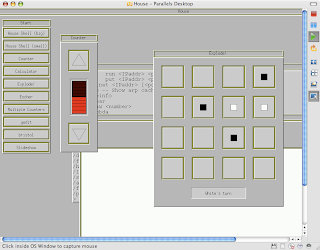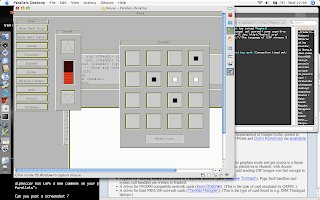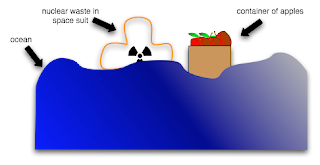House is an operating system written in Haskell. Ever since CSE380 (titled "Operating Systems") and my many many segfaults, I have deeply impressed with those I call "people who know how computers work". So whenever somebody says "I wrote an operating system!"... I simply marvel.
Anyway, was just sort of fiddling with my computer trying to see if I can get it to run, but I was having the toughest time! The thing boots fine under Q (the qemu front end), but nothing I did could make it work on Parallels. Tried renaming it with .hdd extension, but then I just got a grub prompt with no idea how to proceed. Renaming it to .fdd and connecting it as a floppy wouldn't work, so my first reaction was "oh! it must be some kind of crazy Parallels-specific format", so I kept searching the web and asking on IRC, trying to see if anyone know how to produce Parallels-compatible bootable floppy images...
Well you know what the problem was?
Next to the floppy drive icon [connected to hOp-0.8.fdd] are two checkboxes, Enabled and Connect on Startup. Connect on Startup was unchecked.
Yes eric, you have to put the disk in the drive for it to work... good job!
What a dolt.
Edit 2006-01-17
Here are a couple of screenshots, as requested. The first is just the Parallels window:

And the second is of the whole desktop (probably a little gratuitous):

If you're having trouble getting this to work on your machine:
- Rename hOp-0.8.flp to hOp-0.8.fdd
- Add it as the floppy disk drive to your virtual machine
- Set the boot sequence to start with the floppy (or at least, have the floppy somewhere)
- Remember to click that Connect on Setup button next to the floppy config
Parallels might crash the first two times you do this. I have no idea why, but it seems to work after that.
House is an operating system written in Haskell. Ever since CSE380 (titled "Operating Systems") and my many many segfaults, I have deeply impressed with those I call "people who know how computers work". So whenever somebody says "I wrote an operating system!"... I simply marvel.
Anyway, was just sort of fiddling with my computer trying to see if I can get it to run, but I was having the toughest time! The thing boots fine under Q (the qemu front end), but nothing I did could make it work on Parallels. Tried renaming it with .hdd extension, but then I just got a grub prompt with no idea how to proceed. Renaming it to .fdd and connecting it as a floppy wouldn't work, so my first reaction was "oh! it must be some kind of crazy Parallels-specific format", so I kept searching the web and asking on IRC, trying to see if anyone know how to produce Parallels-compatible bootable floppy images...
Well you know what the problem was?
Next to the floppy drive icon [connected to hOp-0.8.fdd] are two checkboxes, Enabled and Connect on Startup. Connect on Startup was unchecked.
Yes eric, you have to put the disk in the drive for it to work... good job!
What a dolt.
Edit 2006-01-17
Here are a couple of screenshots, as requested. The first is just the Parallels window:

And the second is of the whole desktop (probably a little gratuitous):

If you're having trouble getting this to work on your machine:
- Rename hOp-0.8.flp to hOp-0.8.fdd
- Add it as the floppy disk drive to your virtual machine
- Set the boot sequence to start with the floppy (or at least, have the floppy somewhere)
- Remember to click that Connect on Setup button next to the floppy config
Parallels might crash the first two times you do this. I have no idea why, but it seems to work after that.
House runs under Parallels






